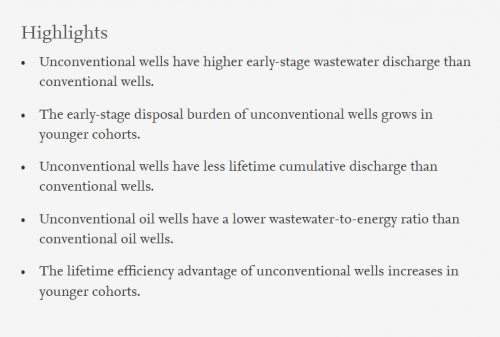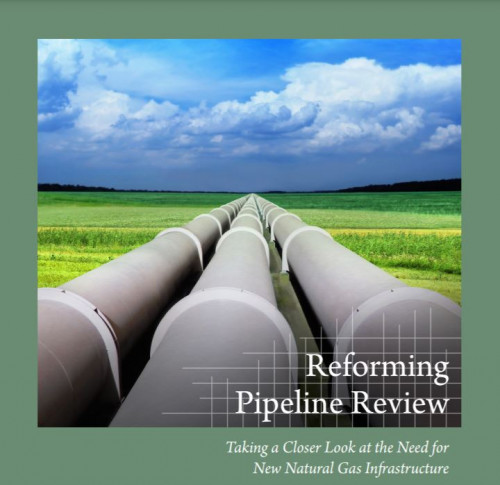-

Does Unconventional Energy Extraction Generate More Wastewater? A Lifetime Perspective
Published in Ecological Economics
The paper analyzes how wastewater generation patterns differ between unconventional wells and conventional wells, accounting for differences in well configurations and local geology. Using the 2008–2016 monthly production data from 50,039 wells, the authors show that unconventional wells generated more wastewater in the first 12 months of production but less cumulative discharge than conventional wells. Unconventional oil wells had a lower wastewater-to-energy ratio throughout their lifetime than their conventional counterparts, whereas no efficiency gap existed among gas wells. These findings call for targeted strategies to balance the short-term disposal burden and the long-term efficiency gains of unconventional energy extraction.
-
Comment Letters on FERC’s Proposed Policy Statements for Natural Gas Infrastructure
In February, the Federal Energy Regulatory Commission released two policy statements that acknowledged the Commission’s role in shaping the nation’s transition to a low-carbon future and called for the consideration of climate impacts in pipeline certificate proceedings. Today, the Institute for Policy Integrity filed two comment letters to these proposed policy statements.
In one of our comment letters—filed jointly with over two dozen legal scholars from institutes across the country—we rebut arguments from opponents of the policies that the Commission lacks authority to consider climate effects in its oversight of natural gas infrastructure under the Natural Gas Act.
In our other comment letter, we explain that the policy statements serve as an important step toward ensuring that upstream and downstream emissions are properly considered in line with the Commission’s statutory obligations, but provide several suggestions for improvements.
-
Comments to FERC on Regional Energy Access Expansion Project DEIS
Today we submitted comments to FERC on the draft environmental impact statement for Transcontinental Gas Pipe Line Co.'s Regional Energy Access Expansion Project. These comments offer recommendations for improving the Commission's assessment of climate and environmental justice impacts of the project, and its consideration of alternatives.
-
Comments to FERC on Iroquois Gas Certificate Order
Today we submitted comments to FERC regarding its decision to grant a certificate of public convenience and necessity to Iroquois Gas for its Enhancement by Compression Project. These comments begin by underscoring the Commission's obligation to independently review and scrutinize lifecycle greenhouse gas emission reports (or other evidence regarding net emissions associated with a project) submitted by applicants. The comments also highlight flaws in Iroquois' analysis which undermine the conclusion that the project will result in a decrease of emissions. The Commission overlooked these flaws in relying on the analysis to conclude the project would result in a net reduction, such that it need not further assess the project's climate impacts.
-
Comments to DOE on CP2 LNG’s Export Application
Policy Integrity filed comments on Venture Global CP2 LNG's application to the Department of Energy (DOE) for authorization to export liquefied natural gas (LNG) to non-free trade agreement nations. We argued that in line with relevant case law, DOE must consider the indirect greenhouse gas emissions associated with the CP2 LNG project in its National Environmental Policy Act (NEPA) review, and weigh the impacts in its Natural Gas Act Section 3 assessment. In doing so, DOE should apply reasonable assumptions to quantify indirect greenhouse gas emissions and better analyze substitution impacts from LNG exports. Furthermore, DOE should refrain from applying its recent NEPA categorical exclusion rule to the CP2 LNG project due to severe legal deficiencies with that rule. Finally, we urge DOE to work with FERC on a single NEPA review for the project because DOE and FERC's Section 3 authorizations are connected actions under NEPA.
-
Reforming Pipeline Review
Taking a Closer Look at the Need for New Natural Gas Infrastructure
The Federal Energy Regulatory Commission (FERC) uses a flawed process to evaluate the need for new, long-lasting gas infrastructure such as interstate pipelines, resulting in a certification process that fails to serve the public interest. As FERC begins to re-examine its approval process for new natural gas infrastructure, our report analyzes the Commission’s authority to consider a broader range of factors when deciding whether a proposed project is in the public interest. The report offers four key recommendations for reform.
-
Comments to EPA and Army Corps of Engineers on Proposed Revised Definition of “Waters of the United States”
The Environmental Protection Agency and Army Corps of Engineers recently proposed a rule to return to the pre-2015 definition of the term “waters of the United States” under the Clean Water Act. We submitted comments encouraging the agencies to more fully elucidate the benefits from the proposed regulation, as the current economic analysis understates the rule's positive environmental effects.
-
Comments on Chumash Heritage National Marine Sanctuary
Policy Integrity submitted comments to the National Oceanic and Atmospheric Administration (NOAA) on its Notice of Intent to Conduct Scoping and To Prepare a Draft Environmental Impact Statement for the Proposed Chumash Heritage National Marine Sanctuary. Our comments describe some of the potential environmental and economic benefits of marine conservation, and suggest potential ways for NOAA to ensure that its environmental impact statement fully evaluates these effects.
-
Comments to EPA on Oil and Gas Sector Methane Standards
In November 2021, EPA proposed standards to regulate methane emissions from new and existing sources in the oil and natural gas sector. Policy Integrity submitted comments supporting the proposed standards, and recommending that EPA strengthen its proposal by regulating additional leaky sources; conducting a distributional analysis of the rule's expected impacts; extending the time frame of its analysis; quantifying co-benefits; and disaggregating costs and benefits to demonstrate that its proposed standards are both individually and cumulatively net beneficial.
We also submitted joint comments with a coalition of other environmental groups on EPA's use of the social cost of greenhouse gases (SC-GHG) in its proposed regulation, recommending that the agency expand its justification of its discount rates and inclusion of global damages in the SC-GHG, and affirm that the SC-GHG is a lower bound of projected climate impacts.
-
Comments to FERC on Wisconsin Access Project EIS
We filed a comment letter with the Federal Energy Regulatory Commission regarding its continued failure to meaningfully assess the climate impacts of natural gas infrastructure projects, this time regarding the Wisconsin Access Project EIS. The company has requested authorization to modify its facilities in Wisconsin to increase its firm capacity by over 50,000 dekatherms per day, which could contribute roughly $55 million in annual climate damage costs.
Viewing recent projects in Natural Resources






